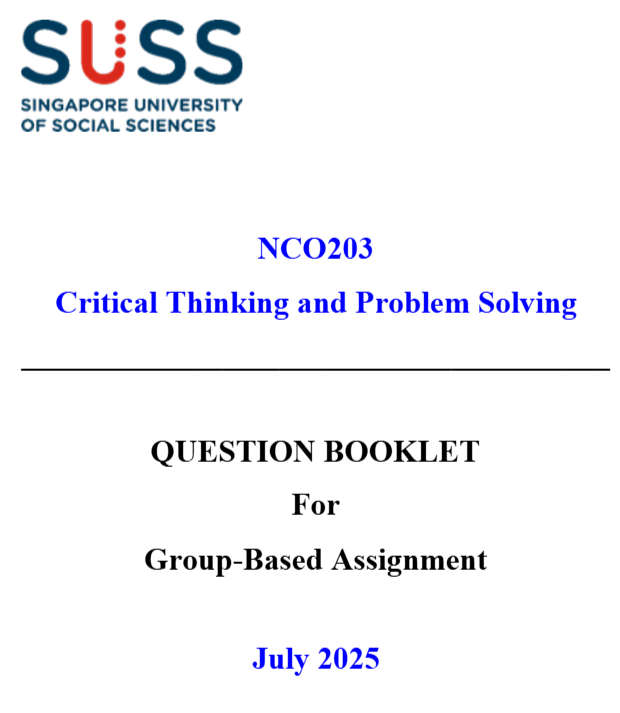| Category | Assignment | Subject | Education |
|---|---|---|---|
| University | Singapore University of Social Science (SUSS) | Module Title | NCO203 Critical Thinking and Problem Solving |
| Word Count | 1200 Words |
|---|---|
| Assessment Title | Group-Based Assignment |
| Academic Year | July 2025 |

This assignment bears a maximum of 100 marks and is worth 50% of the final mark for NCO203 Critical Thinking and Problem Solving.
The deadline for the GBA is as follows:
Friday, 24th October 2025, 11:55 pm
This is a group-based assignment. You should form a group of 3 to 5 members from your T-Group. Each T-Group is allowed a maximum of 12 members. Please elect a group leader who is responsible for uploading the final report on behalf of the group
The GBA consists of 2 parts: 1) a written report and 2) a group presentation.
I. Written report
II. Presentation
No more than 1200 words. Maximum scorable: 45 marks
1. Implement the first stage of the problem-solving framework: Identify and define the problem that you are working on.
a. What is the general problem? (1 mark)
b. Analyse the general problem: Why is the problem worth solving? (4 marks)
c. Analyse the specific problem: What is the specific actionable problem and why? (5 marks)
2. Implement the second stage of the problem-solving framework: Generate possible solutions to the problem.
a. What are all the results of brainstorming? (2 marks)
b. Organise the results: What are the 3 best results and how are they chosen? (3 marks)
3. Implement the third stage of the problem-solving framework: Evaluate solutions.
a. What does research say about the viability of the first possible solution? (4 marks)
b. What does research say about the viability of the second possible solution? (4 marks)
c. What does research say about the viability of the third possible solution? (4 marks)
4. Implement the fourth stage of the problem-solving framework: Practise pre-empting possible problems in implementation.
a. Which possible solution do you choose to implement and why? (3 marks)
b. Write a fallacious argument against your argument in 4a and name the fallacy in brackets after the argument. (3 marks)
c. How would you monitor the solution and why? (4 marks)
d. What problems do you expect and how would you deal with them?
i. Ethical problems (4 marks)
ii. Practical problems (4 marks)
15 minutes. Maximum scorable: 55 marks
1. Summarise the written report (5 marks)
2. Question-and-answer (50 marks)
No more than 1200 words. Maximum scorable: 45 marks
Question 1
1. Implement the first stage of the problem-solving framework: Identify and define the problem that you are working on.
a. Analyse the general problem: What is the general problem? (1 mark)
b. Analyse the specific problem: Why is the problem worth solving? (4 marks)
c. What is the specific actionable problem and why? (5 marks)
Question 2
2. Implement the second stage of the problem-solving framework: Generate possible solutions to the problem.
a. What are all the results of brainstorming? (2 marks)
b. Organise the results: What are the 3 best results and how are they chosen? (3 marks)
Question 3
3. Implement the third stage of the problem-solving framework: Evaluate solutions.
a. What does research say about the viability of the first possible solution? (4 marks)
b. What does research say about the viability of the second possible solution? (4 marks)
c. What does research say about the viability of the third possible solution? (4 marks)
Question 4
4. Implement the fourth stage of the problem-solving framework: Practise pre-empting possible problems in implementation.
a. Which possible solution do you choose to implement and why? (3 marks)
b. Write a fallacious argument against your argument in 4a and name the fallacy in brackets after the argument. (3 marks)
c. How would you monitor the solution and why? (4 marks)
d. What problems do you expect and how would you deal with them?
i. Ethical problems (4 marks)
ii. Practical problems (4 marks)
15 minutes. Maximum scorable: 55 marks
1. Summarise the written report (5 marks)
2. Question-and-answer (50 marks)
Need plagiarism-free Answers for your college/ university NCO203 Assignments
Order Non-Plagiarised AssignmentHaving trouble completing your NCO203 Critical Thinking and Problem Solving assignment on time? Our Assignment Help service is the best for you! Our expert writers offer high-quality, plagiarism-free, and AI-free assignments at pocket-friendly rates. You can even check our free assignment samples before placing your order. We promise on-time delivery and 24/7 support, no matter your academic needs. From Business Management to technical subjects, we cover it all.
Hire Assignment Helper Today!
Let's Book Your Work with Our Expert and Get High-Quality Content
